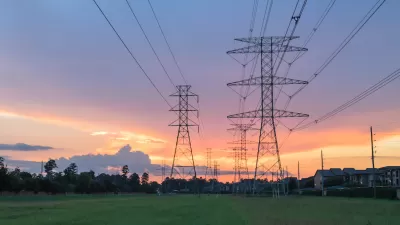Anti-fracking activists in New York who helped ban fracking and construction of a natural gas pipeline in the Empire State now have to contend with trucks transporting compressed natural gas from fracking operations in Pennsylvania.

The Constitution Pipeline was dealt a major setback last March when a federal judge upheld the New York State Department of Environmental Conservation's position on the issue of granting necessary water-crossing permits for the pipeline which would transport Marcellus Shale natural gas from Susquehanna County, Pennsylvannia to Schoharie County, New York. However, that decision hasn't stopped the transport of natural gas between the two states, reports Don Mathisen for The (Oneonta) Daily Star.
“They’re getting gas to market,” said real estate investor and anti-fracking activist Richard Averett. “If they can’t do it by pipeline, they’ll do it by truck.”
Otsego 2000, a local environmental group, is also concerned about the safety posed by the transportation of compressed natural gas (CNG) by Xpress Natural Gas, which is transporting gas from Pennsylvania through Otsego County "to a depot in Manheim, Herkimer County," writes Mathisen. "They return empty along the same roads."
“It’s a matter of safety to people who live along these roads,” said Nicole Dillingham, a lawyer who is president of Otsego 2000. “These trucks are carrying a very highly flammable material on two lane county roads,” said Dillingham.
According to Transportation & Logistics International, XNG "sources natural gas from interstate pipelines, compresses it, and then transports it directly to customers with its fleet of 45 high-capacity, specialized trailers." The number of truck trips made by XNG is in dispute, though, with Dillingham claiming there "could be as many as 200 vehicle trips per day." Matthew Smith of XNG states "there are usually fewer than 30 and they don’t always take the same route."
The situation draws parallels to the crude-by-rail transportation, in the absence of pipelines, of fracked oil from the Bakken Shale in North Dakota to markets east and west. Numerous derailments of oil trains occurred, including the horrendous conflagration in Lac-Mégantic, Quebec in July 2013, killing 47 people and destroying the downtown.
According to the Oneonta Fire Department, there have been no issues reported with XNG trucks to-date which have been transporting CNG since January, notes Otsego 2000.
Hat tip to Mark Boshnack.
FULL STORY: Activists spar over safety of gas tankers

Trump Administration Could Effectively End Housing Voucher Program
Federal officials are eyeing major cuts to the Section 8 program that helps millions of low-income households pay rent.

Planetizen Federal Action Tracker
A weekly monitor of how Trump’s orders and actions are impacting planners and planning in America.

Ken Jennings Launches Transit Web Series
The Jeopardy champ wants you to ride public transit.

Why Bike Lanes Are Good: An Explainer for the US Transportation Secretary
Sean Duffy says there’s no evidence that bike lanes have benefits. Streetsblog — and federal agencies’ own data — beg to differ.

California Invests Additional $5M in Electric School Buses
The state wants to electrify all of its school bus fleets by 2035.

Austin Launches $2M Homelessness Prevention Fund
A new grant program from the city’s Homeless Strategy Office will fund rental assistance and supportive services.
Urban Design for Planners 1: Software Tools
This six-course series explores essential urban design concepts using open source software and equips planners with the tools they need to participate fully in the urban design process.
Planning for Universal Design
Learn the tools for implementing Universal Design in planning regulations.
Ada County Highway District
Clanton & Associates, Inc.
Jessamine County Fiscal Court
Institute for Housing and Urban Development Studies (IHS)
City of Grandview
Harvard GSD Executive Education
Toledo-Lucas County Plan Commissions
Salt Lake City
NYU Wagner Graduate School of Public Service




























